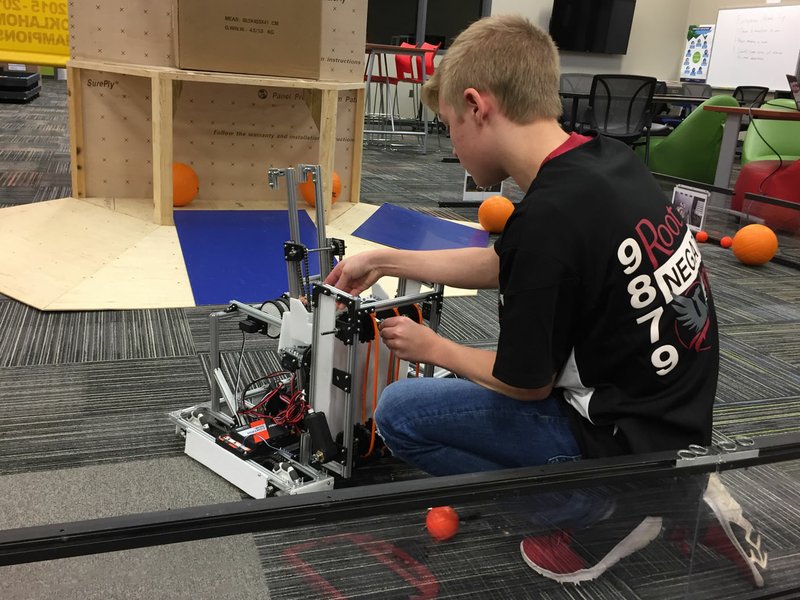SPRINGDALE -- It's go time for the Tyson School of Innovation's robotics team.
Root Negative One was scheduled to leave from the school early today for Dallas, where the team will catch a 14-hour flight to Dubai, United Arab Emirates.
The seven team members will take with them a robot they've spent months designing, assembling and fine-tuning. They -- and their robot -- will represent the United States in the FIRST Global Challenge. There will be 191 nations represented in the Olympics-style event, which runs Thursday through Sunday.
FIRST stands for For Inspiration and Recognition of Science and Technology. The organization is known for its robotics competitions for kids. Students design, build and program a robot to compete in a floor game.
The team has worked "furiously" the past few weeks preparing its robot for competition, said Abby Herrera, one of seven students who will be making the trip.
"Some of our team members have been making adjustments mechanically to the robot while others have been heavily focusing on our engineering design notebooks, but also finalizing the documentation of all of our community outreach," Herrera said during an open house the team hosted after school Friday. "So we have a lot of people working on different things."
The team has Team USA uniforms and Root Negative One buttons to give out as souvenirs. By Friday, the team had started to relax a bit, knowing that its robot was competition-ready.
"So we're moving past the stress, and we're more excited now about the competition," Herrera said.
The team raised more than $40,000 for the trip, according to team member Meghan Boen. Root Negative One found out in the spring they'd be going to the Global Challenge and began raising money soon after.
Chase Rainwater, who coaches the team along with Richard Cassady, said the students have prepared well. The Global Challenge is different from what they're used to, because to build their robot, they had to rely solely on the parts that came in a kit. They can use whatever parts they want for other FIRST competitions, he said.
"So that worked different muscles in the brain to try to put structures together that were reliable," Rainwater said. "I think this is going to benefit us moving forward, but I think we're going to go feeling we did everything we could to be ready for it."
Students will wear matching jerseys with "USA" in big letters down the right side and a U.S. flag on the upper left side. Rainwater and Cassady will wear matching American flag-themed shirts that have a swath of red on one sleeve and stars on a blue field on the other sleeve. The coaches spent hours figuring out how they could look American without looking like U.S. flags, Rainwater said.
This year's Global Challenge game, called Ocean Opportunities, involves two competing alliances -- each comprising three teams from different nations -- working to clear the playing field, or "ocean," of different-sized balls representing pollutants. Robots have 2 minutes and 30 seconds to collect the pollutants and deliver them to specific processing areas.
Root Negative One demonstrated its robot at Friday's open house, including its ability to reach up and hang from a bar, which results in extra points.
The team acquired special documentation to show airport security officials the robot they're transporting does not pose a security threat, Rainwater said.
Root Negative One has provided some long-distance mentoring for two other teams that will be at the Global Challenge: Syria and Eritrea. Team Eritrea is a group of refugees from that country now living in Canada. The Syrian team received its robot kit only last week; getting the kit into that country "has been a battle," Rainwater said.
The FIRST Global Challenge is in its third year. Gold, silver and bronze medals are given out in several different award categories. The ultimate prize is the Albert Einstein Award, which goes to the teams whose robots performed the best and exemplified all of the tenets of the FIRST Global community. Romania won the gold in the Einstein category last year.
The Springdale team recently received its agenda for the competition. It's a full schedule. Herrera hopes to have some time this weekend to do a little sightseeing. "But it looks like we're going to be mostly busy doing competitions," she said.
The team is scheduled to return Monday.
Team USA
Root Negative One consists of 14 students. A maximum of five team members are allowed to participate in the FIRST Global Challenge. The five competing in Dubai are all seniors: Meghan Boen, Bryant Cassady, Abby Herrera, Sara Manos and Catalina Peterson. They will be accompanied by coaches Richard Cassady and Chase Rainwater.
Kate Bowden and Isaac Brown, two other team members who had much to do with the team’s success earlier this year, and Dru Samuelson, an engineering and robotics teacher at the School of Innovation, will travel with the team as well and serve in volunteer roles.
Source: Staff report
NW News on 10/22/2019

